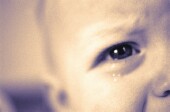
TUESDAY, May 17 (HealthDay News) — Two U.S. Food and Drug Administration advisory committees plan to meet Tuesday and Wednesday to decide whether to recommend that the dosing instructions on the labels of medicines containing acetaminophen need to be fine-tuned to protect children under the age of 2 against possible liver failure and even death.
Currently, the labels of such fever-reducing medications, which include Children’s Tylenol, have dosing instructions for children aged 2 and up. For kids under 2, the labels simply tell parents to “ask a doctor.”
The American Academy of Pediatrics (AAP) and drug manufacturers are both strongly in favor of giving parents the additional dosing information.
“If we give parents better information, they will be able to give enough of the medicine to work well, at the same time minimizing the side effects,” said Dr. Daniel Frattarelli, a pediatrician in Dearborn, Mich. who chairs the academy’s drug committee and who plans to testify before a joint, two-day meeting of the Nonprescription Drugs Advisory Committee and the Pediatric Advisory Committee.
“Parents want to do the right thing for their children,” he said. “We as a medical community have to give them that information so they are able to do this.”
Although the evidence shows that acetaminophen is safe for young children, parents have to be careful with it, pediatricians noted. Giving too much can be toxic to the liver, causing poisoning and even liver failure.
In 2010, there were 270,000 reported overdoses of acetaminophen, according to the American Association of Poison Control Centers. Dosing errors involving children’s acetaminophen products accounted for almost 7,500 cases — nearly 3 percent.
In an ideal world, the parents of infants and toddlers would still consult with their pediatrician or pharmacist to get the proper medication dosing, said Dr. William Basco, director of general pediatrics at the Medical University of South Carolina.
But the reality is that many parents aren’t doing that and are instead guessing about proper dosing. “There is no benefit to having parents guess at the right dose,” Basco said.
Drug makers, including McNeil Consumer Healthcare, which makes Tylenol, also support the change.
“McNeil is committed to encouraging the appropriate and safe use of medicines in children, including adding new dosing information on the OTC pediatric acetaminophen label to assist caregivers and health-care providers in appropriately dosing children, especially those 6 to 23 months of age,” the company wrote in materials submitted to the FDA.
By way of comparison, drugs containing ibuprofen — another heavily used over-the-counter fever reducer — already include dosing information for children under age 2.
Children’s medications containing acetaminophen have been sold over-the-counter since 1959, and dosing information for children has been on the labels since the 1970s, according to McNeil.
Back then, doses for kids were somewhat crude — children 12 and up were advised to take the adult dose, kids 6 to 12 were told to take half that, and kids younger than 6 were told to take a quarter of the adult dose.
Since then, as physicians have learned more about the medications, dosing recommendations for infants and toddlers have become more refined and now should be based on weight, not age, according to the AAP. (Age is still listed on package labeling, the AAP explained.) Kids’ weights can range widely at any given age, so the correct dose for a child on the heavier side may not be the correct dose for a smaller child of the same age.
Though acetaminophen is safe even in newborns if used correctly, the drug makers and the AAP are calling for expanding the labeling information for children 6 months old and up.
Parents should still be encouraged to consult with their physicians before giving medication to younger children, especially those under the age of 3 months, Frattarelli said. Fevers of more than 100.4 degrees need to be taken very seriously in infants, whose immune systems are not fully developed and whose vaccinations haven’t yet fully kicked in, he explained.
The AAP will also recommend dosing instructions be given in the milliliters, a more precise measurement than teaspoons. “A lot of parents think they can open the silverware drawer and take out a spoon, but that’s not a good way to do it,” Frattarelli said.
In addition, the AAP will request that acetaminophen only be sold in products marketed to children in “single-agent” formulations, rather than products that contain acetaminophen and other drugs. That would help avoid parents unwittingly giving a double dose of acetaminophen because they’ve given their child say, a cough medication that also contains acetaminophen and Children’s Tylenol on top of that.
Earlier this month, the Consumer Healthcare Products Association, a trade association for over-the-counter drug-makers, agreed to sell only one concentration of acetaminophen in products for infant and children to prevent dosing errors.
Previously, for example, Infant’s Tylenol liquid drops were much more concentrated than Children’s Tylenol, which could easily lead to confusion if parents didn’t read the label or know there was a difference.
Drug-makers agreed to phase out the infant drops concentration starting in the middle of this year.
In any given week, about 23 percent of kids under age 2 are given acetaminophen, according to background information from McNeil.
“Acetaminophen dosing errors are a rare but potentially very severe adverse event that could lead to liver failure or even death for kids,” said Dr. Richard Dart, president of the American Association of Poison Control Centers, in a news release. “This decision will lessen the chance that parents will give their children the wrong dose.”
At the hearing, the FDA will also consider adding a weight-based dosing regimen to the existing age-based dosing regimen for kids 2 to 12 and to make it mandatory to include a universal measuring tool with all children’s formulas.
More information
The U.S. Food and Drug Administration has more on giving over-the-counter medications to children.

